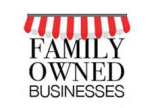
Contrary to general perception, the family business is not just your neighborhood mom-and-pop store, although these single location units do their share in driving the economy. Family businesses, which account for about 35% of the Fortune 500 companies and more than 50% of the country's GDP, are companies in which significant ownership and active management belong to one or more family members. They can have branches in several locations and earn profits in the billions. Among the household name companies that are family-owned are Wal-Mart, Ford Motor Co. and Samsung.
Family businesses come in small, medium and large sizes. But regardless of magnitude, they all share a common strength: a long-term view and commitment to the company's sustainability. However, a number of family-owned enterprises have also failed to pass on the business to the next generation.
If your family has a business and you want to hand it down to future generations, here are three tips that long-running and successful family businesses have implemented:
Plan for succession. Founding entrepreneurs can forget that they do not live forever and that they need competent and knowledgeable persons to take over when they're gone. One reason for overlooking this very important element is the hesitancy of bequeathing something they worked hard for to another person who might not share their passion. Another is simply getting caught up in running the business and putting off the matter of succession until it's too late.
Succession should start early with your children to educate them and instill in them the love for the business. But it is not a rule that one's family members should take up the helm when the existing CEO leaves. Robert Watson, founder of Hayden Homes in Oregon, shares that he and his son Hayden built up their family business together, so succession in this case is inevitable. Ownership is not a measure of one's ability to handle the entity and if the children are not inclined or not capable, an outsider is the better choice of managing the company. The child-heir can become a non-executive director.
Share core values and missions. The family members involved in the running of the business should be bonded together by the same core values, mission and guiding principles. For example, if all employees share the same objective of offering the best quality product at the lowest possible cost, everything they say and do are guided by that principle.
Shared core values will transcend external challenges and internal temporary conflicts so that difficult issues are overcome and solutions are reached. Receding sales, new competitors and economic downturns are obstacles that the family business can conquer if a common mission and vision are set.
It is not enough, however, to formulate a vision-mission statement. Policies and company practices must incorporate the core values to develop a culture that reflects them.
Get a qualified outsider to help. While having your children take over the business is your dream, factors may arise that make this move an unwise one. Your children may lack the skills and experience to assume the daunting task of heading the company or they may have their interests elsewhere. Trusted professionals who have the qualifications your family wants in a manager will do a better job of sustaining the company's growth than non-qualified heirs apparent. Another advantage of hiring an outsider is the objectivity he brings into the family dynamics.
Marie Miller is an accountant and a mother. She runs a small business selling arts and craft supplies

